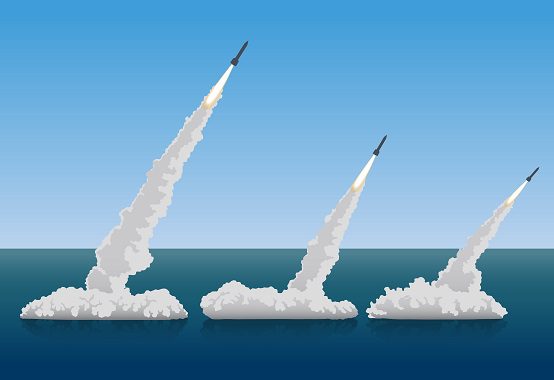North Korea Unites South Korea, Japan, and China

As you would expect, North Korean leader Kim Jong-un declared his nation’s test-firing of a submarine-launched ballistic missile (SLBM) the “greatest success and victory.” What he probably didn’t expect is that it would bring together South Korea, Japan, and China in opposition.
Japan’s foreign minister, Fumio Kishida, said the North’s missile launch was a “provocation that simply cannot be tolerated.” His South Korean counterpart, Yun Byung-se, said that “We must deter North Korea’s further provocative actions.” And Wang Yi, China’s foreign minister, said that “China opposes the development of North Korea’s program, and any words or deeds that create tensions on the Korean peninsula”—even though China is North Korea’s most important ally, biggest trading partner, and main source of food, arms, and energy.
That these three countries are standing together against North Korea in a rare display of unity defies the tensions between them in recent months. Japan has protested Chinese vessels’ entering disputed waters surrounding a group of Japanese-controlled islands in the East China Sea. Japan is critical of a visit by South Korean lawmakers to islands both nations claim. And China has opposed South Korea’s deploying a U.S. theater high-altitude missile-defense system (THAAD), which the Chinese believe could be used against their missiles.
Yet despite these differences, Kishida said, “I hope to co-ordinate closely in order for Japan, China and South Korea to lead the efforts of the international community.” This is a perfect example of countries in a region working together to create a balance of power to offset a local threat and police their own neighborhood—at least in terms of rhetoric.
Unfortunately, the U.S. still provides a security umbrella for South Korea and Japan—at great expense to American taxpayers. It costs the U.S. about $5.5 billion a year to deploy some 54,000 military personnel in Japan and about $2.2 billion for 28,500 U.S. troops in South Korea—and the actual costs are higher when you take into account the additional troops that have to be rotated in to maintain overseas deployments, roughly twice as many more. At least neither Japan nor South Korea are total free riders; both countries share some of the costs. But as long as the U.S. is willing to subsidize their security, neither country has an incentive to take responsibility for defending itself.
The reality is that both Japan and South Korea are wealthy countries that can more than afford to pay for their own defense against North Korea. The combined economies of Japan and South Korea ($4.4 trillion and $1.4 trillion respectively) are more than 100 times larger than North Korea’s ($40 billion), and both spend far more on the military than North Korea does, despite spending a much lower percentage of their GDPs (1 percent for Japan, 2.6 percent for South Korea, and a whopping 25 percent for North Korea).
Clearly, both Japan and South Korea have a tremendous economic advantage over North Korea and the capacity to spend more on defense if needed. What’s a superpower to do? Let them. And let them work with China—if that’s what they deem necessary—to create a stable balance of power in the region based on their own self-interests.
Indeed, this would be a more rational balance of power in the region. Not only can Japan, South Korea, and China afford to be the policemen of their own neighborhood, but the U.S. can afford to let them do so, because North Korea is not a direct military threat to America. America’s security would be better served if it removed its military footprint from the region and served as an offshore balancer-of-last resort, intervening only if the countries in the region could not contain North Korea on their own.
Charles V. Peña is a senior fellow with the Defense Priorities. He has more than 25 years of experience as a policy and program analyst and senior manager, supporting both the Department of Defense and Department of Homeland Security. Peña is the former director of defense policy studies at the Cato Institute and author of Winning the Un-War: A New Strategy for the War on Terrorism.
Comments